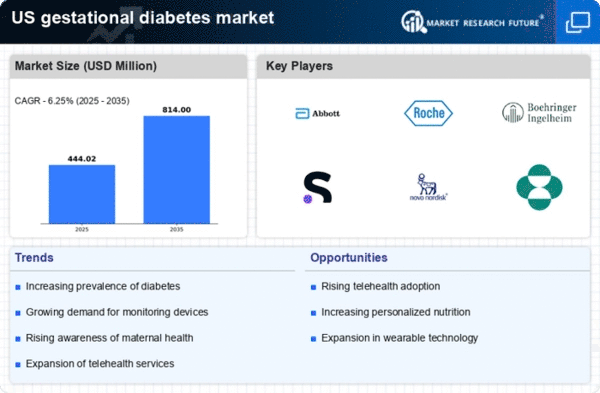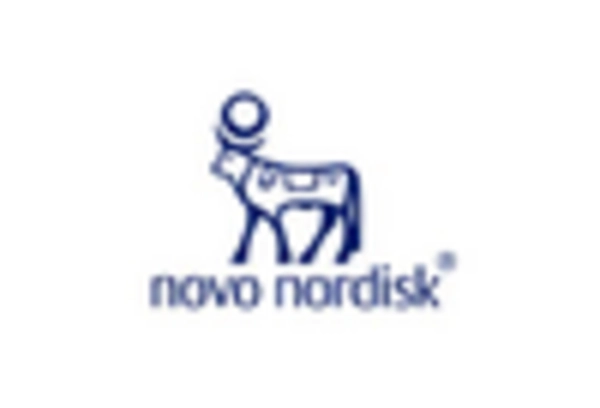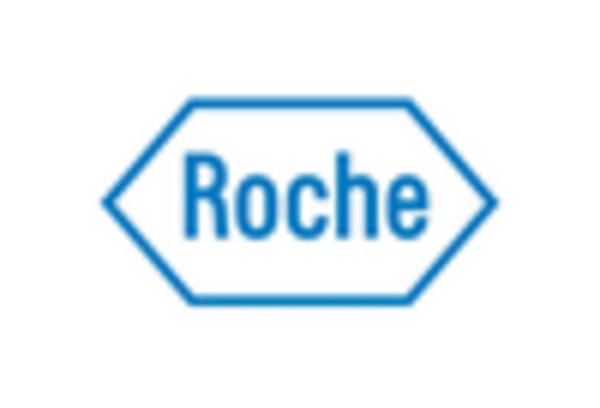Rising Healthcare Expenditure
The increasing healthcare expenditure in the US is another significant driver of the gestational diabetes market. As healthcare costs continue to rise, there is a growing emphasis on preventive care and management of chronic conditions, including gestational diabetes. The US spends over $3.5 trillion annually on healthcare, with a substantial portion allocated to maternal and child health services. This financial commitment is likely to enhance access to screening, treatment, and educational resources for women diagnosed with gestational diabetes. Consequently, the gestational diabetes market is poised for growth as healthcare providers invest in comprehensive care models that address the needs of pregnant women, ultimately improving health outcomes.
Advancements in Treatment Options
The gestational diabetes market is experiencing growth due to advancements in treatment options available for managing the condition. Innovations in insulin delivery systems, such as smart insulin pens and continuous glucose monitoring devices, are enhancing the management of gestational diabetes. These technologies allow for more precise monitoring of blood glucose levels, which is essential for both maternal and fetal health. Furthermore, the development of new dietary management programs and educational resources is empowering women to take control of their health during pregnancy. As these treatment options become more accessible, the gestational diabetes market is expected to expand, driven by the demand for effective and user-friendly solutions that cater to the needs of expectant mothers.
Government Initiatives and Support Programs
Government initiatives aimed at improving maternal health and reducing the incidence of gestational diabetes play a significant role in shaping the gestational diabetes market. Programs that promote awareness, screening, and education about gestational diabetes are being implemented at both state and federal levels. For instance, the Centers for Disease Control and Prevention (CDC) has launched campaigns to educate healthcare providers and expectant mothers about the risks associated with gestational diabetes. These initiatives not only enhance awareness but also encourage early screening and intervention, which is crucial for managing the condition effectively. As a result, the gestational diabetes market is likely to benefit from increased funding and resources allocated to maternal health programs, fostering a supportive environment for affected women.
Increasing Prevalence of Gestational Diabetes
The rising incidence of gestational diabetes among pregnant women in the US is a critical driver for the gestational diabetes market. Recent data indicates that approximately 6-9% of pregnancies in the US are affected by this condition, which translates to around 200,000 cases annually. This increasing prevalence is attributed to various factors, including rising obesity rates and lifestyle changes. As more women are diagnosed, the demand for effective management solutions, including glucose monitoring devices and dietary management programs, is likely to grow. Consequently, healthcare providers are focusing on early detection and intervention strategies, which further propels the gestational diabetes market. The need for comprehensive care and support for affected women is becoming increasingly recognized, leading to a more robust market landscape.
Growing Demand for Personalized Healthcare Solutions
The trend towards personalized healthcare solutions is significantly influencing the gestational diabetes market. As patients increasingly seek tailored treatment plans that consider their unique health profiles, healthcare providers are adapting their approaches to meet these demands. This shift is particularly relevant in the context of gestational diabetes, where individualized management strategies can lead to better health outcomes for both mothers and infants. The integration of data analytics and patient feedback into treatment plans is becoming more common, allowing for adjustments based on real-time health metrics. As personalized healthcare continues to gain traction, the gestational diabetes market is likely to expand, driven by the need for customized solutions that enhance patient engagement and satisfaction.
















